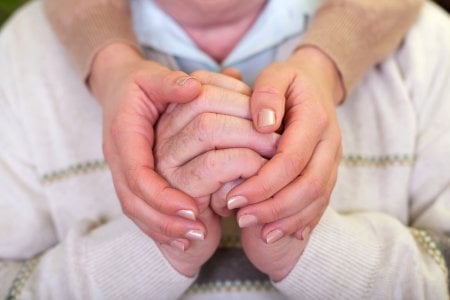Patients move to this country for better dementia care: ‘This is what they deserve’
By
Seia Ibanez
- Replies 7
The heart-wrenching journey of dementia is one that too many Australian families are familiar with.
It's a path marked by gradual loss as loved ones slowly succumb to the ravages of a disease that strips away memory and independence.
The stark reality is that Australia's aged care system is failing many of its most vulnerable citizens.
The shortcomings in care and support for those with dementia have become so pronounced that some families are taking drastic measures.
Some have already sought solace in foreign lands where the care seems more compassionate, comprehensive, and competent.
One such haven has emerged in the picturesque town of Chiang Mai, Thailand, known for its tranquil surroundings and now, increasingly, for its luxury dementia care resorts.
These facilities offer a level of attention that seems worlds apart from what is available in Australia.
James and Teresa Wise made the life-altering decision to move to Vivobene, a care resort in Chiang Mai, when Teresa's dementia worsened.
‘It suits me most of all because of the quantity of care that's available here,’ James said.
‘I know that Teresa has someone with her from six in the morning until ten at night, and in the future, if I need to make that 24 hours, I can.’
The Wises' story is not unique; Chiang Mai has become a refuge for Westerners desperate to escape the failing aged care systems of their home countries.
Brad Roberts, a nurse who left Australia and now runs Vivobene, believed the answer lies in funding and priorities.
‘This is how it's meant to be, this is how our elders should be cared for, this is what they deserve,’ he said.
‘If we can do it over here in Thailand and in a developing country, it saddens me that Australia can't even come close at the moment.’
He has witnessed firsthand the difference in care and believed that Australia could provide similar levels of service with the right investment.
‘The only way it's gonna happen in Australia is the politicians, finally, please inject some money into age care. That's the only way it's gonna happen,’ he said.
‘We need more people, and then you can have good quality care.’
The experience of Pia Schindler, whose mum Lucy suffered from dementia and faced aggressive episodes in a Sydney nursing home, highlighted the deficiencies in the current system.
‘It's a very long goodbye with dementia, a very long goodbye,’ Pia said.
Staff were often ill-equipped to manage her condition, leading to traumatic incidents and a lack of appropriate care.
‘There was one occasion I was called in at three in the morning, and Mum was on a rampage. The staff on that occasion were inside the linen closet,’ she said.
Lucy was covered in bruises from the staff and emergency services trying to restrain her after each episode.
‘It's not OK because I feel like there were steps that were missed prior to this, steps missed in terms of her medication, behavioural changes, types of care that might've been required at different stages for her, and this was just one of the occasions where this happened to her,’ Pia lamented.
While the cost of care in places like Vivobene is quite expensive, dementia patients get the care that they paid for.
James said he paid over $5,000 a month for Theresa's care.
‘It's a quality of care that you can't get in Australia or anywhere else, I think, in the West,’ he said.
‘Unlike in Australia, if you go to an aged care facility, most of them you have to stump up hundreds of thousands of dollars to buy the space or the room or the meal or whatever it is you decide to take.’
‘Here, you don't have to do that. So you just pay the monthly fee.’
Despite the challenges in care, Australia is a global leader in dementia research.
Professor Bryce Vissel's connection to the disease has fueled his determination to find a cure.
‘Seeing my own father's journey with dementia was deeply confronting and very, very difficult. But I really want to see change,’ Bryce said.
‘We need to find a cure. We need to find a drug and solutions that really profoundly change the outcome of this disease.’
His team at St Vincent's Hospital in Sydney explored groundbreaking theories about the disease's origins and potential treatments.
They believed the real reason for the illness might be the damage to links between nerve cells in the brain.
Fixing those links could help restore memory—and they've already shown this idea true in mice.
‘I think it's a very exciting result. I think people find it exciting and are interested in it, certainly by the feedback we're getting,’ Bryce said.
‘We're willing to find out that we're wrong, we're willing to challenge ourselves, we're willing for other people to try and show us wrong. That's science.’
Bryce hoped a treatment to slow dementia’s progression would be available within five to seven years.
You can watch 60 Minutes Australia’s coverage below:
Credit: 60 Minutes Australia / YouTube
As the world becomes more connected than before, a beacon of hope shines through for aged care residents.
In a previous story, a professor delved into the potential of Virtual Reality and Augmented Reality, suggesting they offer ‘lots of potential and opportunity’ to improve the quality of life of those in care facilities. You can read more about the story here.
 What are your thoughts about this story, members? Share your thoughts in the comments below.
What are your thoughts about this story, members? Share your thoughts in the comments below.
It's a path marked by gradual loss as loved ones slowly succumb to the ravages of a disease that strips away memory and independence.
The stark reality is that Australia's aged care system is failing many of its most vulnerable citizens.
The shortcomings in care and support for those with dementia have become so pronounced that some families are taking drastic measures.
Some have already sought solace in foreign lands where the care seems more compassionate, comprehensive, and competent.
One such haven has emerged in the picturesque town of Chiang Mai, Thailand, known for its tranquil surroundings and now, increasingly, for its luxury dementia care resorts.
These facilities offer a level of attention that seems worlds apart from what is available in Australia.
James and Teresa Wise made the life-altering decision to move to Vivobene, a care resort in Chiang Mai, when Teresa's dementia worsened.
‘It suits me most of all because of the quantity of care that's available here,’ James said.
‘I know that Teresa has someone with her from six in the morning until ten at night, and in the future, if I need to make that 24 hours, I can.’
The Wises' story is not unique; Chiang Mai has become a refuge for Westerners desperate to escape the failing aged care systems of their home countries.
Brad Roberts, a nurse who left Australia and now runs Vivobene, believed the answer lies in funding and priorities.
‘This is how it's meant to be, this is how our elders should be cared for, this is what they deserve,’ he said.
‘If we can do it over here in Thailand and in a developing country, it saddens me that Australia can't even come close at the moment.’
He has witnessed firsthand the difference in care and believed that Australia could provide similar levels of service with the right investment.
‘The only way it's gonna happen in Australia is the politicians, finally, please inject some money into age care. That's the only way it's gonna happen,’ he said.
‘We need more people, and then you can have good quality care.’
The experience of Pia Schindler, whose mum Lucy suffered from dementia and faced aggressive episodes in a Sydney nursing home, highlighted the deficiencies in the current system.
‘It's a very long goodbye with dementia, a very long goodbye,’ Pia said.
Staff were often ill-equipped to manage her condition, leading to traumatic incidents and a lack of appropriate care.
‘There was one occasion I was called in at three in the morning, and Mum was on a rampage. The staff on that occasion were inside the linen closet,’ she said.
Lucy was covered in bruises from the staff and emergency services trying to restrain her after each episode.
‘It's not OK because I feel like there were steps that were missed prior to this, steps missed in terms of her medication, behavioural changes, types of care that might've been required at different stages for her, and this was just one of the occasions where this happened to her,’ Pia lamented.
While the cost of care in places like Vivobene is quite expensive, dementia patients get the care that they paid for.
James said he paid over $5,000 a month for Theresa's care.
‘It's a quality of care that you can't get in Australia or anywhere else, I think, in the West,’ he said.
‘Unlike in Australia, if you go to an aged care facility, most of them you have to stump up hundreds of thousands of dollars to buy the space or the room or the meal or whatever it is you decide to take.’
‘Here, you don't have to do that. So you just pay the monthly fee.’
Despite the challenges in care, Australia is a global leader in dementia research.
Professor Bryce Vissel's connection to the disease has fueled his determination to find a cure.
‘Seeing my own father's journey with dementia was deeply confronting and very, very difficult. But I really want to see change,’ Bryce said.
‘We need to find a cure. We need to find a drug and solutions that really profoundly change the outcome of this disease.’
His team at St Vincent's Hospital in Sydney explored groundbreaking theories about the disease's origins and potential treatments.
They believed the real reason for the illness might be the damage to links between nerve cells in the brain.
Fixing those links could help restore memory—and they've already shown this idea true in mice.
‘I think it's a very exciting result. I think people find it exciting and are interested in it, certainly by the feedback we're getting,’ Bryce said.
‘We're willing to find out that we're wrong, we're willing to challenge ourselves, we're willing for other people to try and show us wrong. That's science.’
Bryce hoped a treatment to slow dementia’s progression would be available within five to seven years.
You can watch 60 Minutes Australia’s coverage below:
Credit: 60 Minutes Australia / YouTube
As the world becomes more connected than before, a beacon of hope shines through for aged care residents.
In a previous story, a professor delved into the potential of Virtual Reality and Augmented Reality, suggesting they offer ‘lots of potential and opportunity’ to improve the quality of life of those in care facilities. You can read more about the story here.
Key Takeaways
- Deteriorating aged care in Australia is leading families to seek dementia care overseas, especially in Thailand, where personalised 24-hour care is available in luxury resort settings.
- Australians are choosing these Thai care resorts, like Vivobene, due to the higher quality and quantity of care they offer compared to what's available in Australia.
- Concerns about the Australian aged care system include inadequate staffing, a lack of proper training to deal with dementia patients, and insufficient funding for high-quality care.
- Australian researchers are at the forefront of dementia research, pursuing new theories about the disease's causes and hopeful for a treatment that could slow its progression within the next five to seven years.









